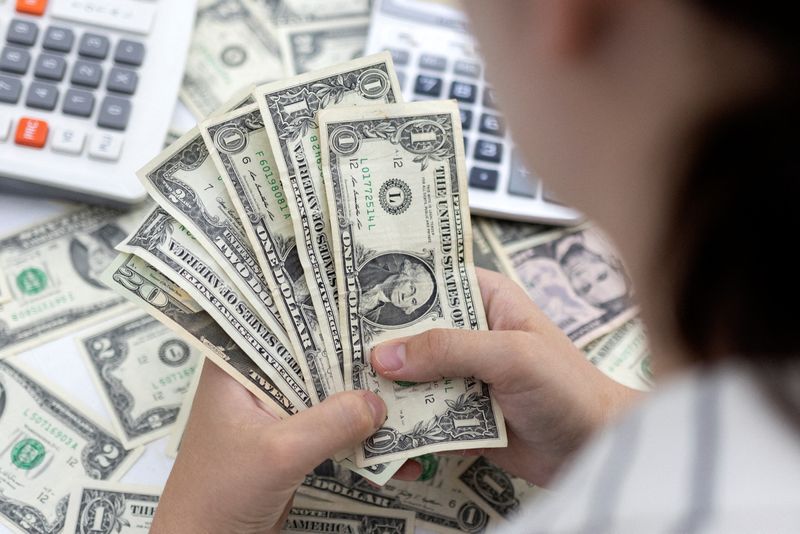By Chuck Mikolajczak
NEW YORK (Reuters) - The dollar index was higher on Wednesday, after U.S. economic data showed inflation increased for August but did little to alter market expectations for the path of rate hikes from the Federal Reserve.
The consumer price index increased by 0.6% last month, the largest gain since June 2022, as gasoline prices jumped, Labor Department data showed. Excluding the volatile food and energy components, the CPI increased 0.3%, moderated by a decline in prices for used cars and trucks.
The data failed to disrupt views the U.S. central bank will hold rates steady at its policy announcement next week at the conclusion of its Sept. 19-20 meeting. The market is pricing in a 97% chance the Fed will keep rates at their current level, up from 92% on Tuesday, according to CME's FedWatch Tool.
Expectations for a 25 basis point hike at the November meeting, which had been creeping up this week, slipped to 40.8% from 41.1% a day ago.
"For me, CPI didn't really change the story that much," said Marvin Loh, senior global macro strategist at State Street (NYSE:STT) in Boston.
"If you think that they need to go another hike, you still think they need to go another hike. If you think they're done, there's probably enough in here where it's done. Probably more important is how you look at next year's cuts and most importantly is that there was nothing in today's number that really changed next year's cut that much."
The dollar index, which tracks the currency against a basket of rival currencies, was up 0.19% to 104.79.
Goldman Sachs chief economist Jan Hatzius said in a note on Wednesday the firm does not expect the CPI report to affect the outcome of next week's meeting in which he sees policy unchanged, and continues to believe the Fed will see a final hike at the November meeting as unnecessary.
Barclays also maintained their call for a pause by the Fed next week, but continue to expect one more hike of 25 basis points by year-end.
Another inflation reading will be released tomorrow in the form of the producer price index (PPI), while retail sales data will also be released.
The euro lost 0.22% to $1.073 against the greenback ahead of the policy announcement from the European Central Bank (ECB) on Thursday.
A source with direct knowledge of rate setters' discussions told Reuters on Tuesday the central bank expects euro zone inflation to remain above 3% next year, supporting the case for a tenth straight interest rate increase this week.
Sterling edged down 0.08% at $1.2485, after data showed the UK economy contracted in July at an unexpectedly sharp rate, as gross domestic product shrank 0.5% from June, below expectations for a 0.2% contraction.
The dollar strengthened 0.27% against the yen to 147.45 as the Japanese currency continued to give back a sharp gain on Monday the resulted in the biggest one-day climb for the yen in two months.
Weekend comments from Bank of Japan (BOJ) Governor Kazuo Ueda heightened expectations the central bank could shift away from its negative interest rate policy, sending the yen surging to start the week, but these were subsequently dampened after influential ruling party lawmaker Hiroshige Seko indicated his preference for an ultra-loose monetary policy on Tuesday.

The yen has come under pressure against the dollar as the BOJ remains a dovish outlier among global central banks, especially since the Federal Reserve began its aggressive rate-hike cycle in March 2022.
Traders have been closely watching for any signs of intervention from Japan to shore up the yen since it weakened past the 145 per dollar threshold last month. A year ago, that level led to the first yen-buying intervention by the authorities since 1998.